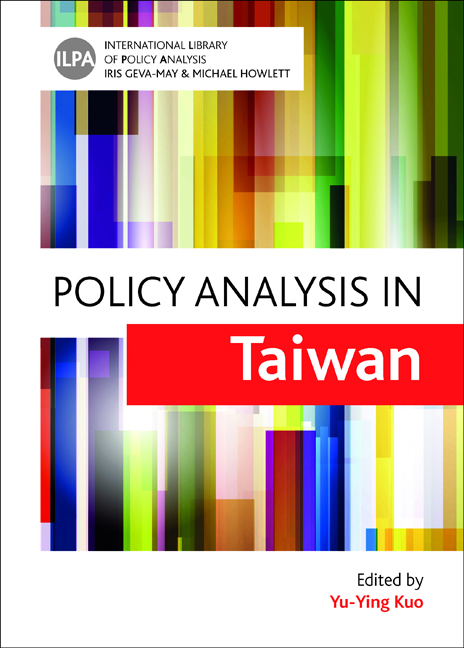Book contents
- Frontmatter
- Contents
- List of tables and figures
- Acknowledgements
- Notes on contributors
- One Policy analysis in a time of turbulence
- Two Exploring policy advisory committees in the central government
- Three Analysis of innovative local government policies in Taiwan
- Four Policy analysis in the legislative body: the legislative process of the Soil and Groundwater Pollution Remediation Act in Taiwan
- Five Policy analysis in the local councils
- Six Gendering policy analysis? The problems and pitfalls of participatory ‘gender impact assessment’
- Seven The power of influencing policies, or getting their share and more: interest groups in Taiwan
- Eight Think tanks in Taiwan
- Nine The development of public engagement in Taiwan
- Ten Social media and policy evolution in Taiwan
- Eleven Policy analysis by non-governmental organisations in Taiwan
- Twelve Policy network of universal healthcare reform in Taiwan
- Thirteen Public policy and administration research
- Fourteen Too critical to ignore? A tri-dimensional relationship examination of policy analysis internship in Taiwan
- Fifteen Policy analysis in Taiwan in an international perspective
- Sixteen Policy analysis education in Taiwan: a comparative perspective
- Index
Seven - The power of influencing policies, or getting their share and more: interest groups in Taiwan
Published online by Cambridge University Press: 11 March 2022
- Frontmatter
- Contents
- List of tables and figures
- Acknowledgements
- Notes on contributors
- One Policy analysis in a time of turbulence
- Two Exploring policy advisory committees in the central government
- Three Analysis of innovative local government policies in Taiwan
- Four Policy analysis in the legislative body: the legislative process of the Soil and Groundwater Pollution Remediation Act in Taiwan
- Five Policy analysis in the local councils
- Six Gendering policy analysis? The problems and pitfalls of participatory ‘gender impact assessment’
- Seven The power of influencing policies, or getting their share and more: interest groups in Taiwan
- Eight Think tanks in Taiwan
- Nine The development of public engagement in Taiwan
- Ten Social media and policy evolution in Taiwan
- Eleven Policy analysis by non-governmental organisations in Taiwan
- Twelve Policy network of universal healthcare reform in Taiwan
- Thirteen Public policy and administration research
- Fourteen Too critical to ignore? A tri-dimensional relationship examination of policy analysis internship in Taiwan
- Fifteen Policy analysis in Taiwan in an international perspective
- Sixteen Policy analysis education in Taiwan: a comparative perspective
- Index
Summary
Introduction
Interest groups are viewed variously in many different political cultures and policy environments, influenced by different historical traditions of thought and practice. The Americans talk mainly of ‘interest groups’, lobbying, and single-issue groups, whereas the British use the term ‘pressure groups’. The word ‘pressure’ has an unfortunate connotation in that ‘many groups operate without resorting to any degree of coercion’ (Watts, 2008: 257). They thus go by various names: interest groups, special interests, organised interests, lobby groups, political groups, and public interest groups. Their purpose is basically much the same: to influence government policies and actions.
Truman (1951: 33) defines such organised interests as ‘any groups that, on the basis of one or more shared attitudes, make certain claims upon other groups in society for the establishment, maintenance, or enhancement of forms of behaviour that are implied by shared attitudes’. While a simple definition may serve as an introduction, many groups are highly organised, with formal constitutions, containing clearly stated aims and objectives, rules and procedures, including the election of officers and the management of resources (Leach et al, 2006: 131). In the British context, pressure groups have been defined as ‘an association of individuals joined together by a common interest, belief, activity or purpose that seeks to achieve its objectives, further its interests and enhance its status in relation to other groups, by gaining the approval and co-operation of authority in the form of favourable policies, legislation and conditions’ (Shipley, 1976: 3).
Political scientists now consider pressure groups or interest groups ‘a normal and vital part of the political process, conveyors of the demands and supports fed into the political system’ (Cummings and Wise, 2005: 202–203). In Dye's opinion (2005: 283), the interest-group system is organised to represent economic, professional, ideological, religious, racial, gender, and issue constituencies. But to British academics, the expression ‘pressure group’ is a comprehensive term which subsumes both sectional interest groups and more widely based attitudinal cause groups (Forman and Baldwin, 2007: 127). While interest groups are concerned to defend or advance the interests of their members (Leach et al, 2006: 133–135), cause groups are based on shared attitudes or values.
In this chapter, there is a considerable overlap between the two types of pressure groups and interest groups.
- Type
- Chapter
- Information
- Policy Analysis in Taiwan , pp. 95 - 110Publisher: Bristol University PressPrint publication year: 2015



